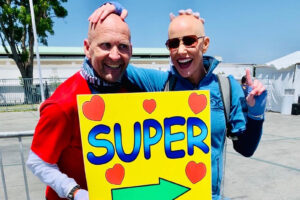Morgan Bellock was 34 and in a dead-end relationship when she decided to freeze her eggs.
She didn’t realize then that this move would save her life.
It started in June 2017 with the initial ultrasound that Bellock, an Illinois publicist, needed to start the procedure. There, doctors found what they believed to be a large ovarian cyst.
Bellock and her doctors weren’t concerned.
After all, she was just 34. She didn’t smoke, she exercised, she wore sunscreen and she was healthy. Her father owned a vegetarian restaurant. She had no history of cancer in her family, and three out of her four grandparents lived until they were nearly 100 (one will be 105 in September).
So the doctor suggested that Bellock switch her birth control. She tried, but it didn’t seem to have any effect on the cyst. Months later, they did another scan. This time, Bellock learned that the cyst would need to be surgically removed.
“When I left the surgery, I remember them saying to me, ‘We got it all and we got something else,’” Bellock says. “I thought, ‘Great, two for one.’”
It was my future child who saved my life.
But one of those “cysts” turned out to be a cancerous tumor.
Bellock says she remembers the day so well. It was October 5, 2017. She thought she was having a simple follow-up procedure. On the way to the doctor, she phoned her mother, as she does daily. Her mother was acting very strange. That’s because the doctor had broken medical protocol and had called Bellock’s parents.
“The doctor was giving me news I wasn’t prepared for, and knew I was alone,” Bellock says. “I remember walking into the office, and the doctor saying, ‘It’s not what we thought—and your parents are here.’ That’s when I blacked out.”
Bellock’s parents had woken at dawn to drive from Michigan to Chicago so they could be there for their daughter when she received the worst news of her life: She had immature teratoma (stage I) ovarian cancer. While the cyst found during her initial scans had been benign, a second lump they found hiding behind it had been the cancerous tumor.
“I didn’t cry for a really long time,” Bellock says. “It’s like when you stub your toe and you know it’s going to hurt but it hasn’t set in yet.”
And then the tears flowed.
Symptoms of ovarian cancer are bloating and cramps, but Bellock hadn’t experienced any of that. The doctor explained that if she hadn’t come to freeze her eggs, she most likely would have physically noticed something within a year or two—but at that point, the cancer would have progressed far.
Bellock had a second surgery to remove her right ovary, followed by a few weeks to recover before another surgery to freeze her eggs. If the cancer spread, she wouldn’t have ovaries at all, so she wanted that done as soon as possible. Bellock was able to freeze 10 eggs, and she learned that she didn’t need chemotherapy.

“I’m just so lucky,” she says. But then, Bellock started considering whether everything happens for a reason. Was she meant to stay in her horrible relationship because if she hadn’t been in it, she wouldn’t have felt the need to freeze her eggs and may not have caught the cancer until it was too late?
“For so long, I didn’t end it even though it was going nowhere because I felt like he saved my life,” Bellock says. “But really, it was my future child who saved my life. I might not be here today, which is a really weird thing to think about.”
Bellock still has her 10 eggs ready just in case she can’t get pregnant naturally. But she’s alive. She’s healthy. She moved on from her previous relationship and met a new, wonderful man. They’re engaged and she is cancer-free.
Today, Bellock is a changed person. She’s hypersensitive. Having cancer can do that to a person.
“Once cancer is a part of you, you automatically have a triggering response,” she explains. Every time she has a cramp, or if something doesn’t feel right, she questions it. She and her brother-in-law got into an argument because he didn’t want to go to the doctor. But Bellock is fully aware of what can happen if you skip appointments.
She also learned to advocate for herself.
“A lot of times in the health system, they say, ‘We don’t have an appointment until next June,’” Bellock says. “I won’t take that. ‘No, you have to see me right now.’”







